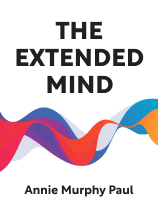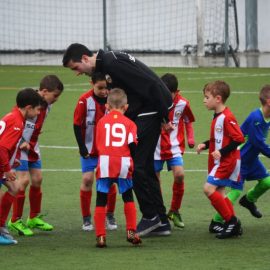

This article is an excerpt from the Shortform book guide to "The Extended Mind" by Annie Murphy Paul. Shortform has the world's best summaries and analyses of books you should be reading.
Like this article? Sign up for a free trial here.
Want an overview of Annie Murphy Paul’s The Extended Mind? How can you learn to think more productively and efficiently?
In The Extended Mind, Annie Murphy Paul teaches you several simple cognitive strategies and habits that will help you better understand complex ideas and focus more intently on your goals. Her simple methods show you ways to unlock more creative ideas and connect more deeply with others.
Read on for an overview of Annie Murphy Paul’s The Extended Mind book.
The Extended Mind Overview
If you imagine a genius scientist or philosopher, you may picture someone sitting alone, lost in thought, slowly formulating their world-changing ideas entirely in their head. However, truly effective thinking could look very different. In The Extended Mind, Annie Murphy Paul argues that optimal cognition isn’t about withdrawing deeper into our minds—it’s about engaging more with the world outside of our heads. As a science writer, Annie Murphy Paul argues in The Extended Mind that intelligence has less to do with our neurobiology and more to do with how well we use the external world to enhance our thinking.
According to Paul, people who know how to make use of external aids have such a cognitive advantage because modern society is at odds with our neurobiology. Our brains evolved to suit a hunter-gatherer lifestyle in which we were actively engaged with our bodies, the world around us, and our relationships with each other. However, the world has quickly changed, and our society, full of abstract ideas, artificial environments, and social isolation, no longer stimulates our brains in a way that unlocks their full potential.
Once you start thinking in a way that suits your brain’s biology, Paul argues that you can tap into your full cognitive potential. Specifically, you can learn and understand complex ideas more thoroughly, focus more intently on your goals, come up with more creative solutions to your problems, and communicate, collaborate, and empathize more effectively with those around you.
| Become Happier by Catering to Your Biology The mismatch between our ancient neurobiology and modern society doesn’t just make it harder for us to think optimally—it also makes it harder for us to achieve optimal happiness. In The Happiness Hypothesis, Jonathan Haidt uses an evolutionary lens to analyze humanity’s struggle to find happiness. Haidt explains that we evolved to have a negativity bias: We typically fear and dislike bad things more than we enjoy good things. This negativity bias gave our hunter-gatherer ancestors a strong aversion to risk, which helped them avoid life-threatening danger. However, in our modern society in which we’re typically not in danger of sudden death, this negativity bias just makes us more likely to be unhappy. But there’s good news: Just like we can improve our thinking by engaging with the world outside our minds, Haidt argues that we can achieve happiness by similarly catering to our biology. Our brains are naturally satisfied by the gradual progression toward difficult goals. By choosing gratifying goals that draw on our strengths, we can make ourselves happy. In particular, two goals that have the most positive impact on happiness are deepening meaningful connections with others and gaining more autonomy over your life. |
Enhancing Cognition Using Your Body
The first way you can use external aids to enhance your cognition is by actively engaging with your body. By paying attention to how your body feels and how you’re choosing to move it, Paul argues, you can access a more expansive way of thinking.
Let’s examine four strategies for how to use your body to think more effectively.
Strategy #1: Listen to Your Body
In The Extended Mind, Annie Murphy Paul asserts that by becoming more sensitive to how your body feels, you can access a wealth of quick and accurate subconscious knowledge. The brain perceives and stores vastly more information than you’re aware of, and it understands far more complex and subtle patterns than you can consciously grasp. This subconscious information manifests as an intuition you can feel in your body as subtle physical sensations.
Consequently, research has shown that people with greater bodily awareness display instinctive skills in cognitively demanding domains. In one study, researchers found that financial traders who could more accurately report the rhythm of their heartbeat made more profitable decisions than traders who were less aware of their bodies.
Strategy #2: Exercise Strategically
Another way you can use your body to improve your cognition is by exercising in a way that matches the kind of thinking you want to do. In The Extended Mind, Annie Murphy Paul distinguishes among mild exercise, moderate exercise, and heavy, sustained exercise, and she asserts that each level of physical exertion has a different effect on your brain.
- First, Paul states that mild exercise (which includes standing and fidgeting, which is any small repetitive movement) boosts your ability to focus and your overall quality of thought when compared to simply sitting still.
- Second, Paul explains that moderate exercise, which includes brisk walking and any other brief or light physical activity, boosts your thinking in the same way as mild exercise but with an even stronger effect. Unlike mild exercise’s impact, this cognitive enhancement lasts for up to two hours after you stop exercising.
- Last, Paul asserts that heavy, sustained exercise that significantly raises your heart rate for 40 minutes or more has a very different effect on the brain. This kind of exercise impairs your thinking: As your brain devotes more mental resources to managing your body, it reduces activity in the prefrontal cortex. As a result, you fall into a mild trance state in which it’s harder to think logically, but it’s easier to come up with new ideas and creative connections. Therefore, if you need a boost of creativity, try heavy exercise.
Strategy #3: Use Your Body to Think Through Ideas
In The Extended Mind, Annie Murphy Paul asserts that by engaging in bodily motions while learning abstract concepts, you can recall those concepts more easily later, especially if you’re able to repeat the same learned movements. Ideally, these movements will be conceptually related to the ideas themselves—for instance, you may move your hands to act out the different stages of a butterfly’s life cycle—but physical movement makes ideas easier to remember even if the motions have nothing to do with them. For example, raising your arms every time you study the capital of Iran will help you remember what it is in the future.
Strategy #4: Gesture With Your Hands to Think and Communicate Better
Paul asserts that another way we can use the body to enhance our cognition is by gesturing more with our hands. This is because our gestures are more in touch with our subconscious minds than the words we say.
When we’re learning something new, or when we’re struggling to understand a particularly challenging idea, we instinctively gesture to represent ideas that we don’t consciously understand clearly enough yet to put into words. This kind of gesturing helps us clarify ideas and come to a better understanding of what we already know, both in our conversations with others and when thinking things through on our own. You can use this to your advantage: The next time you find yourself deep in thought, gesturing more expressively may help you discover valuable insights.
Enhancing Cognition Using the Physical World
Now that we’ve discussed how to incorporate your entire body into the act of thinking, let’s expand our focus outward. The second way we can use external aids to enhance our cognition is by more intentionally engaging with the immediate physical world around us.
Give Your Thoughts Physical Form
If you’re trying to learn something, solve a problem, or generate new insights, Annie Murphy Paul recommends giving your thoughts physical form—The Extended Mind provides suggestions like writing them down, representing them in images, or modeling them in some other tactile way. Moving your thoughts from your head into the physical world means that you don’t have to actively remember as much, giving you more mental capacity to think effectively.
(Shortform note: Many experts argue that a strict system dictating how to habitually externalize your thoughts is the key to personal organization. For instance, The Bullet Journal Method, Getting Things Done, and Building a Second Brain all offer distinct, intricate systems of organizing your thoughts outside of your head. These systems have much in common: They detail how to sort the information you record, as well as how and when to review and act on that information.)
Enhancing Cognition Using Other People
We’ve covered how to expand your thinking with the body and the physical world, taking advantage of the fact that our brains thrive in a tactile, physical environment. Now, let’s explore how to take advantage of the fact that our brains thrive in a social environment.
Imitate others: If you want to learn a new skill or accomplish a goal, Paul suggests closely imitating a highly skilled expert. Humans are naturally proficient imitators: As children, we learn everything about navigating the world by imitating those around us. Thus, imitating an established expert is one of the most effective ways to learn and succeed.
Enhance your thinking through teaching and debate: We’ve previously established that it’s sometimes necessary to retreat into solitary thinking to work through your ideas without distraction. However, Paul explains that thinking with other people activates more complex parts of the brain than thinking alone, resulting in greater understanding, memory, and insight.
Bond with a team: Finally, Paul explains that we can enhance our thinking by bonding with a team. Our neurobiology changes drastically when we see ourselves as part of a group of people like us, in ways that often make it easier to accomplish goals. When you’re sufficiently bonded, you’ll have an easier time communicating with teammates, empathizing with them, and learning from them.

———End of Preview———
Like what you just read? Read the rest of the world's best book summary and analysis of Annie Murphy Paul's "The Extended Mind" at Shortform.
Here's what you'll find in our full The Extended Mind summary:
- Why you don't need to withdraw into your mind to achieve optimal cognition
- Cognitive strategies and habits that will help you better understand complex ideas
- How gesturing with your hands helps you think better






